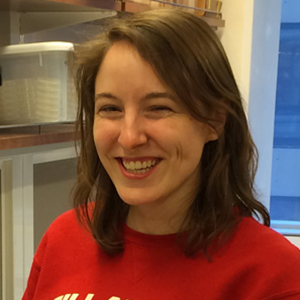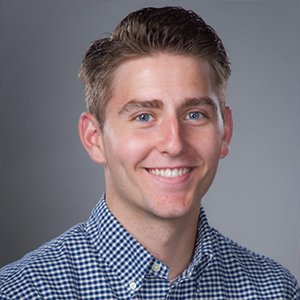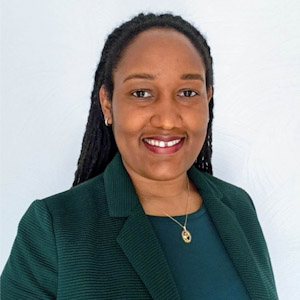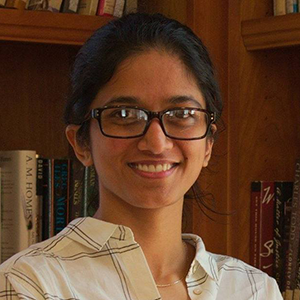Taking time before a Ph.D.
One question I get asked a lot is whether someone should go straight into a Ph.D. program from undergrad, or if they can or should take a year — or several — to work first. I took three years between my undergrad degree and starting my Ph.D. program, and it was definitely the right choice for me. But my own experience doesn’t necessarily mirror everyone’s, so this week I spoke with four other people who took time between completing their undergrad and starting their Ph.D., and learned about their experiences.
I spoke with:
- Katie Carnazza, who worked in clinical research at Columbia University for two years and as a lab tech at Memorial Sloan Kettering Cancer Center for two years before going to Weill Cornell Medicine for a Ph.D.
- Rachelle Copeland, who worked as a high school science teacher in Texas for five years before getting her Ph.D. at Penn State University.
- Ramya Kolli, who worked in conservation research for half a year in India, got a master's at New York University, worked as a tech for a year at NYU and then got her Ph.D. at the University of Georgia.
- Mike Kimble, who worked as a technician for a year and a half at Boston Children’s Hospital before starting a Ph.D. at Columbia.
I’ll also include my own opinions! I worked as a technician for two years at Massachusetts General Hospital and then worked as a deckhand on tall ships for a year before getting my Ph.D. at Columbia.
Spoiler: There may be selection bias, but everyone I spoke to about this was happy they took time before grad school. I had planned this article to be a pros and cons article. But the only “con” anyone brought up was that you are starting grad school a bit older than everyone else, which is sometimes a con.
So instead, here are the top benefits people found from taking time before grad school.
Help clarifying a direction that is best for you
Katie Carnazza is a Ph.D. candidate in the lab of Jacqueline Burré at Weill Cornell, where she studies neurological disorders and neurodegeneration.
“All jobs have bad things. The goal is to find a job where the bad things are not terrible for you,” Carnazza told me. Working for a bit before committing to a five-plus-year Ph.D. program can help you figure out what that job might be for you, she said. In fact, everyone I spoke with said that, in one way or another, working before starting their Ph.D. program gave them more clarity on the direction they wanted to go in their careers.

Carnazza said that, although she knew she wanted to study neurodegeneration, “I wasn’t sure when I graduated whether I wanted to go into academia or go to medical school. I thought I wanted to do a Ph.D. but I wasn't sure. That’s why I took the clinical job (at Columbia) first. I figured it would be a good way to tell.” It was a good way to tell, and she discovered that working with patients wasn’t for her, so medical school was out. She switched jobs and worked for two years in a wet lab at Sloan Kettering. That fit better, and she moved on to a Ph.D. program at Weill Cornell.
Ramya Kolli is a postdoc at Duke University. She also said the work experience she got between her undergrad and her Ph.D. helped her find a good direction. She earned her bachelor's in biotechnology in India and decided to get a master's in biotechnology at NYU partially because she knew she wanted to study in the U.S. somewhere, but she wasn’t sure what exactly she wanted to study. “During my master's, I knew I wanted to do a Ph.D. but I was clueless about what to pursue. I ended up taking an elective in ecotoxicology, and I said, ‘Oh, I want to do a Ph.D. in that!’"
Rachelle Copeland works at a biotech company in California.
She said also knew she wanted to go to grad school, but she wanted to learn some other things first. “When I was a junior or senior in college, I decided I didn't want to go to grad school right away. So I thought, ‘Do I find a lab job or a teaching job?’” Copeland had worked in a lab as an undergrad, written a thesis in chemistry and already had a handle on what full-time research might be like, so she thought she’d learn the most from a teaching job.
“I wanted to know if teaching was something I wanted to pursue long term,” she said.
Having grown up in Jamaica, she also wanted to understand the American school system better and get insight into why there were so few students of color in upper-level STEM classes. After five years of teaching at two different high schools, she said, she felt ready to return to academia for a Ph.D.
“It helped me figure out my values as a person, which helped me steer through grad school.” Copeland said. She also had learned that she enjoyed teamwork and working toward a larger goal, rather than on an independent project, and that her working environment and the people she worked with were important. These insights influenced what lab she chose in grad school and what jobs she applied for after her Ph.D.
Mike Kimble is a grad student in the lab of Lorraine Symington at Columbia, where he's studying DNA repair.
Kimble used his time as a tech at Boston Children's Hospital to pin down the right direction for him too. “I worked in a lab as an undergrad, but that work could be kind of disjointed. I could only come in here and there, and grad students would start or finish experiments for me, as schedules dictated. So I didn’t really know what working in a lab full time was like.” He said used his time as a technician to see what it felt like working all day in a lab. Turns out he liked it enough to go to grad school. He even ended up pursuing research in his Ph.D. that was related to his work as a technician.
I also learned a lot about my goals by working between my undergrad degree and grad school. I spent some of that time as a technician in a lab and some of that time working completely outside the molecular biology field — on tall ships. While my time on boats was probably the happiest in my life, I found that something in the back of my mind kept calling me back to molecular biology. That gave me a little bit of certainty that I was choosing a path that was good for me.
Skills and confidence building
All of the people I spoke with mentioned that they learned skills while working that have helped them in their careers. Those who worked in research specifically found the accumulation of lab skills helpful in grad school. “Because I had worked, I had all these skills that made my rotations easier. The classes were easier too, because I knew a lot of the concepts already. My first semester was much less stressful for me, because not everything was new,” Carnazza said.
Kolli agreed that her time researching gave her concrete research skills as well as a confidence boost. She also added that, by the time she applied for her Ph.D., she had already written a paper, which certainly helped her application.

Kimble said that his work experience taught him lab skills that helped in the interview process and then later served him well in grad school. He said he was able to have deeper conversations about research than he’d have been able to have without that work experience and straight from undergrad. “It might have been more beneficial if I’d taken more time, actually,” he said. “One and a half years was almost too short to really get into a project.”
I also found that my job helped me early on in grad school. Even now, 10 years after I left my technician job, I am still drawing on the skills I learned and mentoring I received as a technician. I still think about things my boss said to me that were helpful and insightful. In fact, I even still call some of the people I met during my time as a tech for advice when I feel stuck.
Copeland also mentioned skills she gained during her time working outside the lab as a teacher, particularly the communication skills she gained, that have helped her through her Ph.D. “According to feedback from my advisers, they didn't have to teach me how to communicate and present. Teaching helped me become able to communicate with different audiences. Feedback I consistently heard through grad school is that people didn't have trouble following my presentations.”
Providing a broader frame of reference and perspective
Another benefit of not going right from school to more school is getting a chance to gain a broader perspective of the world, to widen your horizons, and become more solid in your own identity.
Carnazza said that working gave her the time and space to make a thoughtful decision about her career, instead of doing things by default. “Some people finish undergrad, and they don’t see the full breadth of careers available to them. They just think grad school is next, and they go, and then, when it gets really hard, they think, ‘What am I doing?’ So when it gets hard for me, and it does, at least I know I made the best decision for myself at the time.”

Copeland, the former teacher, also found her time before grad school to be a good for her perspective: “It was important seeing that there’s more to life outside of science. In academia, people sometimes act as though what they are doing is all that there is. All of their goals, everything, is around this thing that is a very, very fine sliver of the entire world. One of the things that helped me to not stress out during grad school is: 'What I’m doing, this protein, it doesn’t care about me.' When you go from having a hundred people whose lives are impacted by what you do, it puts things in perspective.”
Another perspective she gained is about the default way academia runs. “When I was teaching, there were very clear expectations. From the district to the school to the department, it was clear as to what the standard for success looked like, and there was support. In grad school, on the other hand, there are all these tacit rules no one tells you, and unless you happen to have that cultural capital, when you walk in the door you have to just figure them out. Working outside of academia showed me: It doesn’t have to be the way it is. When you’re in the system, you take it for granted. If more people had an outside perspective of academia, it would make science better.”
One element of perspective I found important from my time between undergrad and Ph.D. is finding my identity outside of school. Working helped me build a set of experiences and a community of friends who were not related to my schooling in any way. While having friends who are doing a Ph.D. or are in research is a wonderful thing, and my grad school friends are some of my best friends, I also really value having friends who didn’t have anything to do with my academic career. And the years I spent between undergrad and grad school helped me find those friends.
When I was working on boats, I had the chance to live with and become friends with people whose lives were very different from mine and to see things and places very different from my familiar life. Even when I worked as a technician, I was lucky to be able to build a group of friends in Boston who were unrelated to my academic career. I can’t imagine my life now without those people. They help me remember how big and beautiful the world is outside my little sliver of research, help keep my moral compass pointing north, and helped me remember throughout my Ph.D. that I was a whole human, not just a grad student. They allow me to have an identity not tied to the success of my research and give me a reality check.
Practical benefits
Working before grad school can also provide some practical life benefits and lessons.
For example, Ph.D. programs in the life sciences usually pay, but not that much. I was happy to have worked as a technician before going to grad school because I was able to save a small amount of money, whereas I couldn’t save much in grad school. Had I gone straight to grad school after undergrad, I would have even less financial security than I have now (which admittedly still is not much).

Carnazza mentioned the experience of living independently and learning life skills, like how to find an apartment and other practical skills, as important outcomes of working. Had she gone straight to grad school, she said, she’d have gone from student housing to more student housing, and she would have missed out on the chance to learn to be more independent and navigate the world by herself.
Kimble graduated college early, and he said that working as a technician helped him use his extra time beneficially.
Kolli also found research to be a good way to use time; coming from India, she faced several hurdles trying to navigate the U.S. visa and immigration system as well as school application cycles. Research positions both in the U.S. and in India helped her use that time productively.
I'll close with something Copeland said: “I think if someone knows with a great degree of certainty exactly what they want to research, maybe they should just do their Ph.D. If someone is more curious or unsure, maybe taking time off would help.”
Enjoy reading ASBMB Today?
Become a member to receive the print edition four times a year and the digital edition monthly.
Learn moreFeatured jobs
from the ASBMB career center
Get the latest from ASBMB Today
Enter your email address, and we’ll send you a weekly email with recent articles, interviews and more.
Latest in Careers
Careers highlights or most popular articles

From humble beginnings to unlocking lysosomal secrets
Monther Abu–Remaileh will receive the ASBMB’s 2026 Walter A. Shaw Young Investigator Award in Lipid Research at the ASBMB Annual Meeting, March 7-10 in Washington, D.C.

Chemistry meets biology to thwart parasites
Margaret Phillips will receive the Alice and C. C. Wang Award in Molecular Parasitology at the ASBMB Annual Meeting, March 7-10 in Washington, D.C.

Decoding how bacteria flip host’s molecular switches
Kim Orth will receive the Earl and Thressa Stadtman Distinguished Scientists Award at the ASBMB Annual Meeting, March 7–10, just outside of Washington, D.C.

Defining JNKs: Targets for drug discovery
Roger Davis will receive the Bert and Natalie Vallee Award in Biomedical Science at the ASBMB Annual Meeting, March 7–10, just outside of Washington, D.C.

Upcoming opportunities
No matter where you are in your career and what future path you aspire to, everyone needs leadership skills. Join ASBMB for practical strategies for building and practicing leadership skills.

Close out ASBMB 2026 with a bang
The closing reception of the 2026 ASBMB Annual Meeting will be held at the Torpedo Factory Art Center in Alexandra, Virginia.

